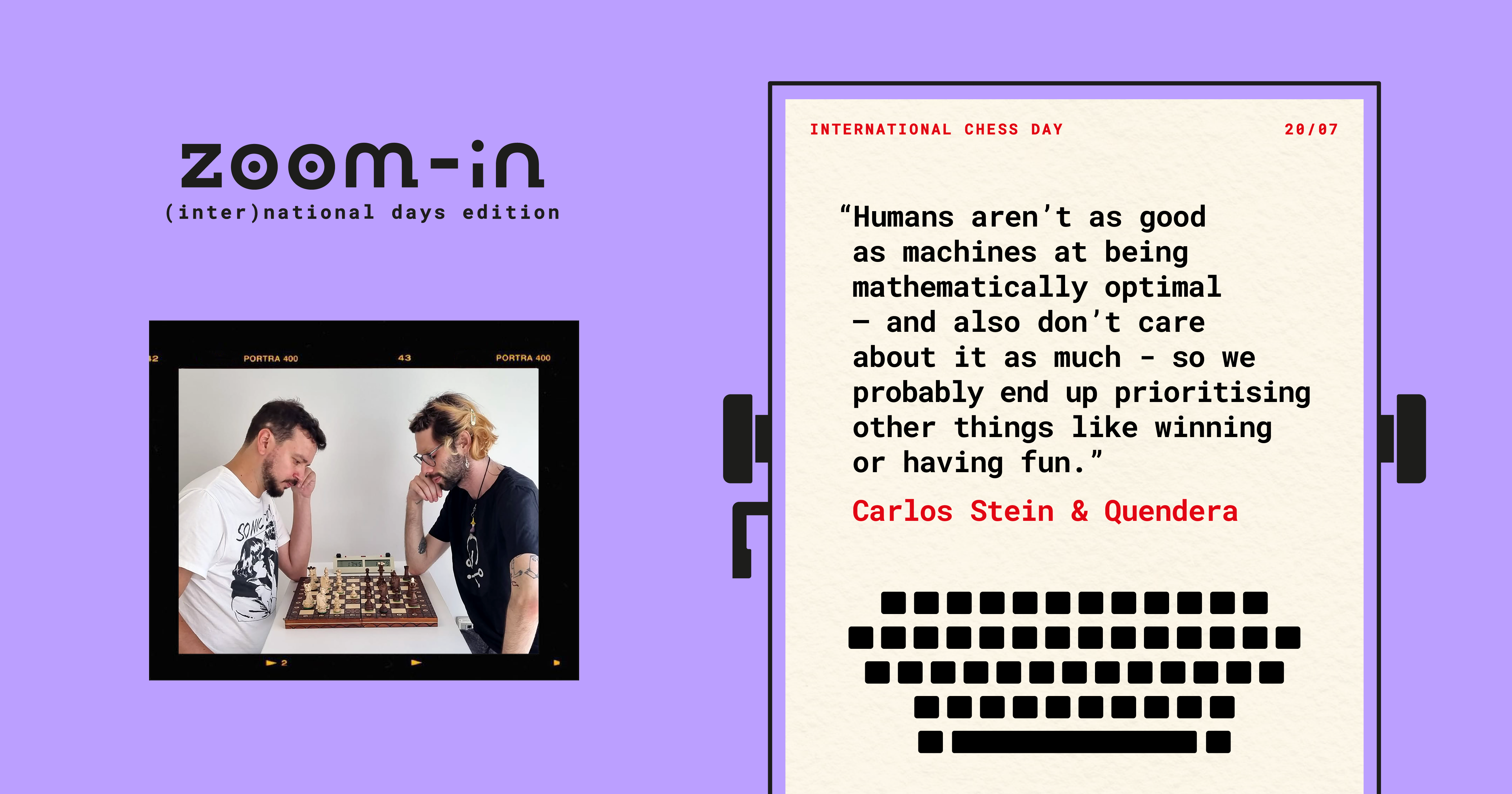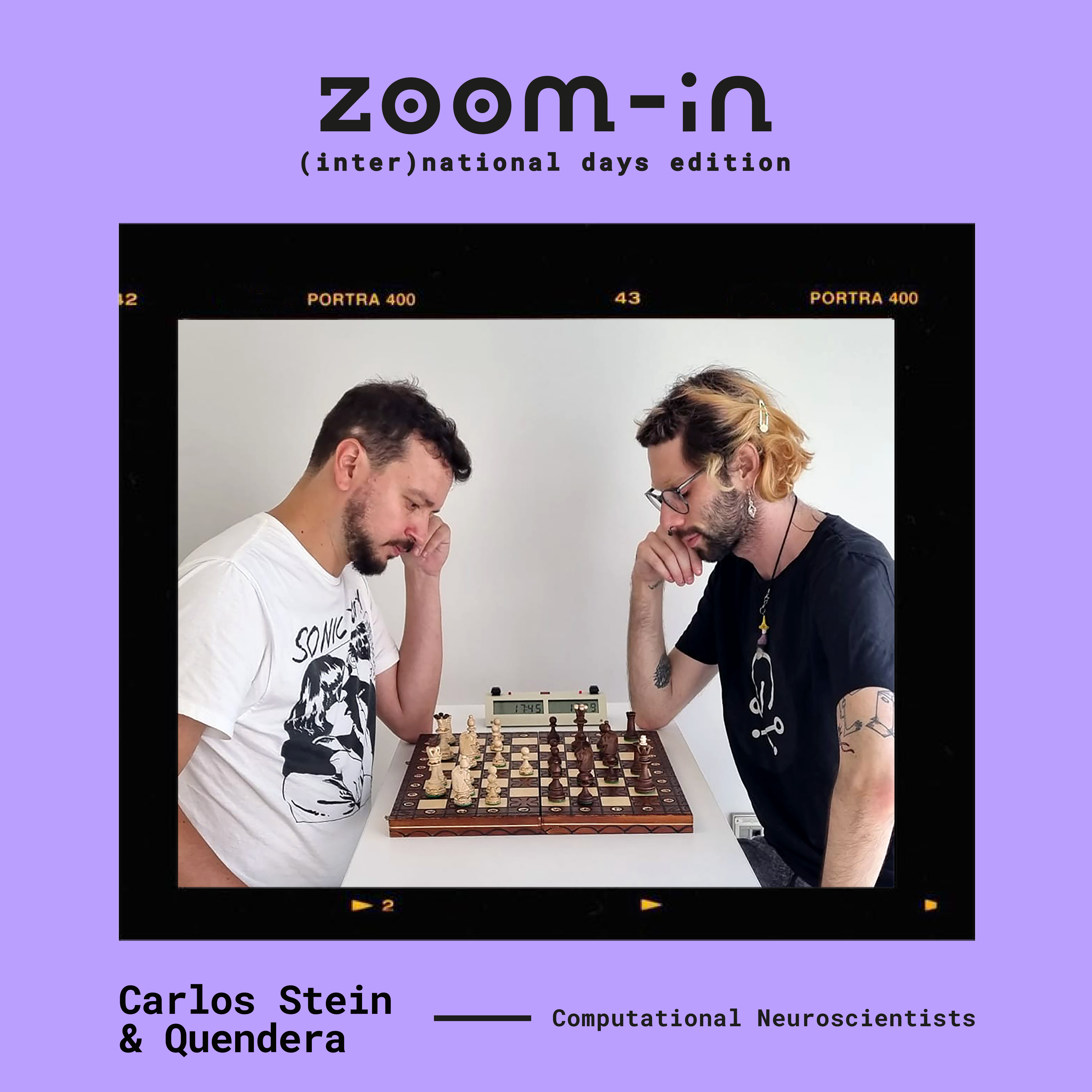Around 600 million people around the world play chess, with 70% of adults having played at some point in their lives; and as 20th July is International Chess Day, we spoke to Champalimaud Researchers Carlos Stein Brito and T. Quendera to find out more about why they play and what the game means to them as scientists.
Carlos is a Computational Neuroscientist at the Champalimaud Foundation, developing neural network models of learning and motor control, in the interface between brain circuits and artificial intelligence. He has a PhD from EPFL, in Lausanne, Switzerland, and post doctorate from the Gatsby Unit UCL, in London.
Quendera (they/them) is a psychologist turned computational neuroscientist at the Champalimaud Foundation. While a self-confessed “unremarkable chess player”, they study it as a part of their PhD where they attempt to model and address how humans make complex decisions and how their mental health impacts them.
Easter egg: the interviewees set-up the chess set in the photograph in homage to a very famous chess game. Do you know it?? Answer at the end of the interview!
On International Chess Day, let’s start with an obvious question: do you have any tips for those thinking about taking up this incredibly popular, yet equally challenging game?
Quendera: Most of the interesting things in life take a lot of work to do well. When I struggle with learning something I try to remember how I struggled with English classes as a kid - today I work in English and it's very rewarding to speak it comfortably. Learning any complex task has moments where it just feels useless but, most importantly, moments of insight where everything just clicks. In chess, there's nothing more rewarding to me than when you see a great tactic on the board that your opponent failed to see - or most commonly, when I blunder really hard!
The best part is that this happens at all skill levels, so to people that think chess is too hard I say: it’s hard for everyone, so just find your match and go have fun together.
Quendera says ‘have fun’, but chess often seems like a very serious business - is it ever actually fun??
Carlos: Good point! There is a meme where a naive player asks, “When does chess start being fun??”, and the old-dog player answers, “That’s what’s cool, it never does!!” I started playing chess with friends at sidewalk tables in bars in Brazil, and it is definitely fun, both to (sometimes) beat your friends and to be surprised by passer-by enthusiasts or curious people of all kinds. I’ll never forget when a street vendor kid passed by and started playing with us, talking about his difficult life and how he enjoyed the few moments he was free to play chess. Chess seemed like a window to another life for him.
Online playing gets closer to an addictive puzzle though, candy crush style, though you still appreciate the beauty of each game during binges. The endless variety of piece combinations that can arise in different games is fascinating.
Has playing chess taught you anything about yourself?
Quendera: My step-dad gifted me a book about chess when I was around 8 years old. I have fond memories of playing it with him back then. In this book, I learned about how old the game was and how complex. Many years later, studying psychology, I stumbled across chess again. I became really fascinated with how complex our decision making as humans is. It is amazing to see how much work and dedication it has taken to develop artificial intelligence agents that can beat us at such a “simple thing” like a game of chess. These machines have potentially infinitely larger memory and computational power, and yet, sometimes still lose. I like to believe that the defining feature of human intelligence is thus something closer to intuition than to reasoning. That’s a hard pill to swallow as a scientist, but one I fondly go back to more and more each day.
Does playing chess give you any particular insight as a scientist, or perhaps change the way you might look at something?
Carlos: Chess makes me reflect a lot on the neuroscience of decision-making. For instance, in reinforcement learning - one of the frameworks in machine learning that has been instrumental in understanding human behaviour - an agent interacts with its environment, receiving positive or negative feedback depending on its actions. One way to approach this problem is to learn, through trial and error, direct mappings from patterns to responses (e.g. you see your opponent’s unprotected bishop, so you take the bishop), like fancy reflex arcs, without using an explicit model of what happens multiple steps in the future, thus called model-free decisions. But for complex scenarios, we also use our internal models of the world, or of the chess game, to wisely simulate different paths, plan ahead and choose accordingly, in a model-based manner (maybe taking that unprotected bishop was a trap and you’ll lose your queen in a few moves!). In chess, both abilities are at play at all times, and it’s an interesting introspective exercise to see what process is dominating at a given moment and how they develop while you get more experience. From last year to now, I can definitely “see” things on a board that I was oblivious to back then. But if I’m honest, it’s less clear how much of it translates to other things in life or if my planning abilities have been improving at all.
A lot of researchers seem to enjoy this game: is there some inherent connection between science and chess?
Carlos: As a theoretical neuroscientist, the parallels are everywhere. Finding patterns in complex settings, thinking about different hypotheses and counterfactuals, or dealing with adversarial reviewers. I especially appreciate that chess has an intricate mix of intuitive pattern recognition, a gut feeling that some moves or positions just feel right, with very logical and precise reasoning, in which a single swap in move order will completely reverse your fate in the game. When developing a mathematical theory mixing intuition with formal reasoning is key to developing something both interesting and correct.
Quendera: The history of scientists studying the game of chess goes back as far as science itself does. Games have always been rich environments for scientists to test their theories on. Computational scientists have looked at the game of chess, in particular, due to its incredibly large universe of possibilities. And while there are more possible variations of chess games than there are atoms in the observable universe, humans are still incredibly good at it. In fact, it took artificial intelligence researchers almost 40 years to develop an algorithm that could beat the best of humans at the time.
Today, anyone can see the optimal play for any given board configuration on their phone, but when we research even the best players in the world, they do not always play optimally. Humans aren’t as good as machines at being mathematically optimal - and also don’t care about it as much - so we probably end up prioritising other things like winning or having fun.
Thankfully, neither me nor our community is anywhere close to figuring out the answers to all of these questions: it means I can have the pleasure to keep working on them for the foreseeable future - hahaha!
Easter egg answer: Photograph emulates Game #1 of the 1997 rematch between Kasparov (Carlos, white) vs Deep Blue (Quendera, black).
Edited by John Lee, Content Developer of the Champalimaud Foundation Communication, Events and Outreach team.



